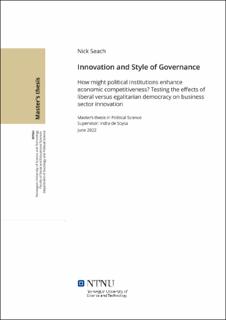| dc.contributor.advisor | de Soysa, Indra. | |
| dc.contributor.author | Seach, Nick. | |
| dc.date.accessioned | 2022-07-19T17:22:58Z | |
| dc.date.available | 2022-07-19T17:22:58Z | |
| dc.date.issued | 2022 | |
| dc.identifier | no.ntnu:inspera:104661336:69832233 | |
| dc.identifier.uri | https://hdl.handle.net/11250/3007050 | |
| dc.description.abstract | En nøkkelfaktor for utvikling og velstand i land er økonomisk vekst, dette antas ofte å komme på bakgrunn av fremskritt innen innovasjon. I den forbindelse er land som ønsker å utvikle sine økonomier avhengig av institusjoner og styresett som gir gunstige forhold for innovasjon. Selv om enkelte autokratiske land har sett en enorm økonomisk vekst de siste tiårene, anses demokrati fremdeles å være den ideelle formen for styring når det gjelder generell velstand. Derimot er det fremdeles en pågående debatt angående hvilken form for demokrati som er mest gunstig for innovasjon. Denne oppgaven forsøker dermed å bidra til denne debatten, hvorav jeg benytter meg av tidsserie-tverrsnittsanalyse for å teste mellom liberal- og egalitært demokrati. Jeg bruker data om innovasjon fra World Economic Forum (WEF), som fungerer som en proxy for innovasjon i næringslivet, samtidig som jeg tester data om konkurranseevne fra International Institute for Management Development (IMD). Dataen om liberal- og egalitært demokratisk styresett er hentet fra Varieties of Democracy (VDEM) dataprosjekt. Jeg testet effekten på alle landene som WEF (145) og IMD (58) sine datasett inkluderer, samtidig som jeg måler effekten kun på høyinntekts demokratier. Analysen medførte flere resultater, hvorav de mest bemerkelsesverdige funnene inkluderer at; egalitært demokrati har en signifikant positiv effekt på innovasjon for høyinntekts demokratiske land, mens liberalt demokrati har en marginal positiv effekt. Videre, ved å skille demokratikomponenten (frie og rettferdige valg) fra de uavhengige variablene, fant jeg at demokrati i seg selv hadde en signifikant positiv effekt på innovasjon for høyinntektsland, mens det hadde en marginal negativ effekt når alle land ble inkludert. I tillegg hadde den egalitære komponenten en signifikant positiv effekt på konkurranseevnen for alle land, mens den liberale komponenten hadde en positiv effekt på konkurranseevnen for høyinntektsland. | |
| dc.description.abstract | Most would agree that a key determinant for development and prosperity is economic growth, which is commonly thought to be based in technological change and innovation. Therefore, nations looking to develop their economies in search of prosperity, are dependent on institutions and governance to provide favourable conditions in this regard. Even though some autocratic countries have seen immense economic growth in recent decades, democracy is overwhelmingly believed to be the ideal form of governance in terms of long-term development for overall human prosperity. That being said, the question of what style of democratic governance being most conducive to innovation, is a question still very much up for debate. As such, this thesis attempts to examine exactly this question, by utilising time-series-cross-sectional analysis to test empirically whether liberal or egalitarian style of democracy better explains economic innovation. I apply data on innovation from the World Economic Forum (WEF), which serves as a proxy for business sector innovation, whilst additionally testing data on competitiveness from the International Institute for Management Development (IMD). The data on liberal- and egalitarian style of governance is obtained from the Varieties of Democracy (VDEM) data project. I tested the effects on all the countries that the WEF (145) and IMD (58) datasets include, as well as a sample of high-income democracies. The analysis yielded intriguing results. The most notable findings are that egalitarian democracy has a significant substantially large positive effect on innovation for high income democratic countries, whilst liberal democracy has a marginal positive effect. Further, when separating the democracy (free and fair elections) component from the independent variables, I found that democracy itself had a significant positive effect on innovation for high income countries, whilst having a marginal negative effect when all countries were included. In addition, the egalitarian component had a significant positive effect on competitiveness for all countries, whilst the liberal component had a positive effect on competitiveness for high income countries. | |
| dc.language | eng | |
| dc.publisher | NTNU | |
| dc.title | Innovation and Style of Governance
How might political institutions enhance economic competitiveness? Testing the effects of liberal versus egalitarian democracy on business sector innovation | |
| dc.type | Master thesis | |
